 Foreign Businesses Bet on High-End Tech, Cost-Effectiveness to Win in a Changing China
Foreign Businesses Bet on High-End Tech, Cost-Effectiveness to Win in a Changing China(Yicai) July 31 -- Overseas companies in China have turned to high-end positioning, localization, and cost-effectiveness to adapt to the country's ongoing structural adjustments, economic cycle challenges, and manufacturing industry development.
Tennant will bring a new product that will make its global debut at this year's China International Import Expo, Zhang Guanghui, spokesperson of the US commercial and industrial floor cleaning machine maker, told Yicai. "The new model's performance is similar to that of the previous one, but much cheaper."
The new product is developed based on the needs of Chinese customers, with its key advantage being its higher cost-effectiveness, Zhang noted, adding that listening to the voice of customers is essential to surviving in China's increasingly competitive market.
Even though Kärcher's cleaning equipment for the industrial sector still holds some advantages in China, its all-in-one washing and mopping machines have fallen behind Chinese rivals, Tang Xiaodong, the German cleaning technology developer's president for China, told Yicai.
To tackle this issue, Kärcher had to follow a new path based on its deep cleaning advantage to develop differentiated products, Tang explained. This year, the company is expanding its market presence in China through collaborations with Legoland Shanghai Resort and high-speed rail stations.
The keys to Kärcher's success in China are a high degree of localized production and flexible market operations, Tang noted.
Plansee is aiming to become more and more Chinese, according to Cheng Dongji, deputy general manager and sales director of Plansee Shanghai High-Performance Materials, the Shanghai-based subsidiary of the Austrian manufacturer of refractory metal products and solutions.
Plansee's production base in Shanghai's Lingang Special Area is the company's core research, development, and manufacturing hub in Asia-Pacific. It has achieved a turnover of nearly CNY1 billion (USD139 million) since it commenced operations in September 2013.
Benefiting from the rapid growth and innovative investment in the Chinese semiconductor industry, the construction of the third phase of the Shanghai factory, which cost Plansee CNY130 million (USD18.1 million), is almost completed, Cheng told Yicai.
However, as the capacity of the third phase has been almost completely booked, Plansee is already planning to build a fourth phase, Cheng noted.
The company's growth in China is the fastest among global markets, Cheng said. Capitalizing on this market opportunity, it is continuously increasing its investment in localized R&D and manufacturing, shifting its strategy from introducing advanced technologies to China to developing new products specifically for the Chinese market, he explained.
Not only manufacturing firms but also service-oriented ones are facing the same issues.
The Chartered Financial Analyst Institute, a global not-for-profit organization that provides finance education for investment professionals, released a Chinese language version of its Certificate in Environmental, Social, and Governance Investing on July 29, marking the first time it had issued a non-English language product to meet demand from a local market.
The Chinese language Certificate in ESG Investing is more cost-effective than the English language one. In fact, its price is only about 55 percent of the original product, or as low as 40 percent on promotion.
Editor: Futura Costaglione